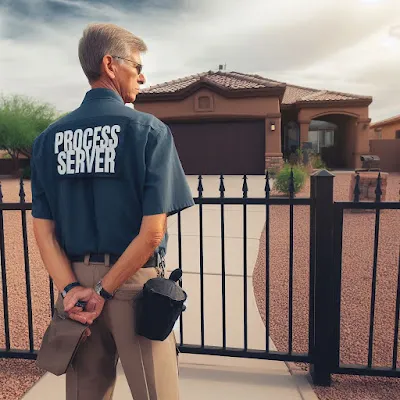Arizona Process Servers: Ethical Practices & Legal Boundaries

Serving legal documents is a crucial component of the justice system, ensuring that every party involved in a legal case is informed and given the chance to respond. In Arizona, as in other states, process servers must adhere to specific ethical guidelines and legal boundaries. These not only ensure the efficacy of the service but also protect the rights and privacies of individuals. Here’s what you need to know about these stringent rules:
- Transparent Identity: It might seem cinematic to witness a process server masquerading as a pizza delivery person. However, in reality, such tactics are illicit. Process servers must be forthright about their identity and cannot conceal their true intent. When they approach someone, they must clearly state their purpose.
- Steering Clear of Law Enforcement Impersonation: While process servers handle legal documents, they do not possess the authority of law enforcement officers. Misrepresenting oneself as a police officer is not only unethical but also illegal. Even if a server has a background in law enforcement, those credentials cannot be flaunted in their role as a process server.
- Mailbox Etiquette: A person’s mailbox is sacrosanct. Federal laws prohibit anyone, including process servers, from tampering with another’s mail or mailbox. While they can use the U.S. Postal Service for official communications, direct interaction with an individual’s mailbox is strictly off-limits.
- No Forced Entry: Respect for private spaces is paramount. Process servers cannot forcibly enter a home or any private establishment, even if it’s to deliver critical documents. Invitation is the only way in; covert or forceful entries are a strict no-no.
- Treading Carefully on Private Grounds: “No Trespassing” isn’t just a sign; it’s a clear directive. While certain jurisdictions might exempt process servers, many don’t. Without explicit permission, private property boundaries should not be crossed.
- Adhering to Regional Norms: Laws and regulations for process servers vary across states and localities. It’s essential and mandatory for process servers to be abreast of these ever-evolving rules. Ignorance isn’t an excuse, and flouting these norms can lead to legal consequences.
Finding an Ethical Process Server
Given the rules’ gravity, it’s imperative to engage a process server known for their ethical practices. Conduct thorough research, consider their reputation, and examine if any claims have been filed against them. A criminal background check can also offer insights into their professional conduct. Entrusting your legal documents to an ethical and knowledgeable server, like The Process Server, ensures seamless service without compromising legality or morals.
Remember, a process server’s commitment isn’t just to the legal documents but also to the principles of justice, respect, and fairness. Ensure you’re choosing someone who embodies these values.
We’ve Compiled Additional Resources Relevant to the Topic
- Arizona Supreme Court – Rules for Process Servers: Review the official rules and regulations governing private process servers in Arizona.
- National Association of Professional Process Servers (NAPPS): Explore NAPPS’s Code of Ethics and best practices for process servers nationwide.
- Arizona Revised Statutes – Process Server Regulations: Access the Arizona statutes outlining regulations for private process servers.
- U.S. Postal Service – Federal Mail Laws: Learn about mail and privacy guidelines relevant to process serving.
- Federal Trade Commission – Identity Misrepresentation: Understand federal regulations on identity misrepresentation and deceptive conduct.
- Legal Information Institute – Trespassing Laws: Gain insights into trespassing laws and how they relate to process serving.
- Arizona Attorney General – Consumer Protection and Complaints: File complaints or learn about consumer protections in Arizona.
- American Bar Association – Ethical Standards in Legal Services: Explore the ethical guidelines for legal professionals and their applicability to process servers.
- Maricopa County – Process Server Registration: Access information about registering as a process server in Maricopa County.
- The Process Server (TPS) Code of Conduct: Discover TPS’s ethical practices and dedication to professionalism in the field of process serving.
